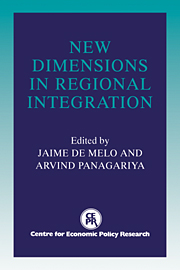Book contents
- Frontmatter
- Contents
- List of figures
- List of tables
- Preface
- Foreword
- Acknowledgements
- List of conference participants
- PART ONE SYSTEMIC ISSUES
- 1 Introduction
- 2 Regionalism and multilateralism: an overview
- Discussion
- 3 Regionalism versus multilateralism: analytical notes
- Discussion
- 4 Multilateral and bilateral trade policies in the world trading system: an historical perspective
- Discussion
- 5 GATT's influence on regional arrangements
- Discussion
- PART TWO COUNTRY ISSUES
- Index
3 - Regionalism versus multilateralism: analytical notes
Published online by Cambridge University Press: 04 May 2010
- Frontmatter
- Contents
- List of figures
- List of tables
- Preface
- Foreword
- Acknowledgements
- List of conference participants
- PART ONE SYSTEMIC ISSUES
- 1 Introduction
- 2 Regionalism and multilateralism: an overview
- Discussion
- 3 Regionalism versus multilateralism: analytical notes
- Discussion
- 4 Multilateral and bilateral trade policies in the world trading system: an historical perspective
- Discussion
- 5 GATT's influence on regional arrangements
- Discussion
- PART TWO COUNTRY ISSUES
- Index
Summary
With the Uruguay Round still (at the time of writing) on the brink, with growing tensions between the United States and Japan, and with growing support in the United States for a more or less aggressive industrial policy, it is evident that the GATT-centred system of multilateral trade relations is in considerable trouble. At the same time, regional trading arrangements such as ‘EC 1992’ and the North American Free-Trade Area (NAFTA) have appeared to be the cutting edge of whatever successful international negotiations have taken place. This apparent shift away from globalism to localism has created severe ambivalence among policy intellectuals. Should the rise of regional trading arrangements be welcomed, as a step on the road that will ultimately reinforce global free trade? Or should regional trading blocs be condemned, as institutions that undermine the multilateral system? Or, yet again, should they perhaps be accepted more or less grudgingly, as the best option we are likely to get in an age of diminished expectations?
This ambivalence, and the striking extent to which reasonable analysts find themselves in sharp disagreement, are not surprising. The issue of multilateralism versus regionalism is a difficult one to get one's arms around, on at least two levels. First, even in narrowly economic terms it is a tricky area: after all, it was precisely in the context of preferential trading arrangements that the byzantine complexities of the second best were first discovered.
Second, the real issues cannot be viewed as narrowly economic. International trading regimes are essentially devices of political economy; they are intended at least as much to protect nations from their own interest groups as they are to protect nations from each other.
- Type
- Chapter
- Information
- New Dimensions in Regional Integration , pp. 58 - 79Publisher: Cambridge University PressPrint publication year: 1993
- 83
- Cited by

